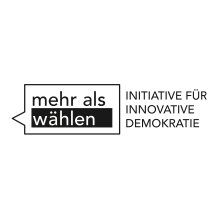 Germany, like many places in Europe, is badly in need of democratic rejuvenation, says Verena Friederike Hasel, a contributing journalist for Die Zeit, who is currently working on a book on political innovation. But where other countries are experimenting with bringing voices from the street into the political process, Germany’s dark history casts a shadow on efforts to break down barriers to political participation, she writes for POLITICO.
Germany, like many places in Europe, is badly in need of democratic rejuvenation, says Verena Friederike Hasel, a contributing journalist for Die Zeit, who is currently working on a book on political innovation. But where other countries are experimenting with bringing voices from the street into the political process, Germany’s dark history casts a shadow on efforts to break down barriers to political participation, she writes for POLITICO.
Germans have been more reluctant to tinker with their political system, she adds, but that’s starting to change, through such initiatives as Demokratiekonvent and Mehr Demokratie.
Europeans should be concerned not simply with whether particular parties are rising or falling, but whether healthy renewal is occurring in the way citizens understand and engage with democratic processes, argues Carnegie’s Richard Youngs.
 A sense of proportion and nuance should lead observers to question the widespread tendency to treat democratic erosion in Europe as essentially inseparable from rising nationalism, Euroskepticism, and any number of other ills shaking the continent’s core liberal edifice. Even if all these phenomena are interrelated and of much concern, they are not all coeval with democratic regression, he contends.
A sense of proportion and nuance should lead observers to question the widespread tendency to treat democratic erosion in Europe as essentially inseparable from rising nationalism, Euroskepticism, and any number of other ills shaking the continent’s core liberal edifice. Even if all these phenomena are interrelated and of much concern, they are not all coeval with democratic regression, he contends.
 Carnegie’s Reshaping European Democracy Project draws from the expertise of a core team of experts on a number of themes, including democratic trends within member states, the European Parliament elections, new participative initiatives, digital democracy, and the democratic impact of EU policies, Youngs adds, including:
Carnegie’s Reshaping European Democracy Project draws from the expertise of a core team of experts on a number of themes, including democratic trends within member states, the European Parliament elections, new participative initiatives, digital democracy, and the democratic impact of EU policies, Youngs adds, including:
CONTENTS
- Is Macron’s Grand Débat a Democratic Dawn for France? Renaud Thillaye
- A Liberal-Centrist Vision for Europe? Richard Youngs and Camino Mortera-Martinez
- Are Increasing Inequalities Threatening Democracy in Europe?
Staffan I. Lindberg - Democratizing Europe’s Economy
Niccolò Milanese - 2019 European Parliament Elections Will Change the EU’s Political Dynamics
Stefan Lehne and Heather Grabbe - Beyond Consultations: Reimagining EU Participatory Politics
Alberto Alemanno
- Harnessing Digital Tools to Revitalize European Democracy
Elisa Lironi - Getting Europe’s Direct Democracy Right
Richard Youngs - New Approaches to Upholding Democratic Values in Poland
Agata Gostyńska-Jakubowska - After the Hungary Vote, EU Needs a Broader Approach to Halt Illiberal Slide
Richard Youngs - The Nature of Democratic Backsliding in Europe
Staffan I. Lindberg - Europe Up for Grabs: The Looming Battle Lines of the 2019 European Parliament Elections
Alberto Alemanno
- Is Europe’s Problem Illiberal Majoritarianism or Creeping Authoritarianism?
Michael Meyer-Resende - How Citizens Can Hack EU Democracy
Stephen Boucher - En Marche: From a Movement to a Government
Claudia Chwalisz - Recession and Renewal in European Democracy
Richard Youngs and Sarah Manney







